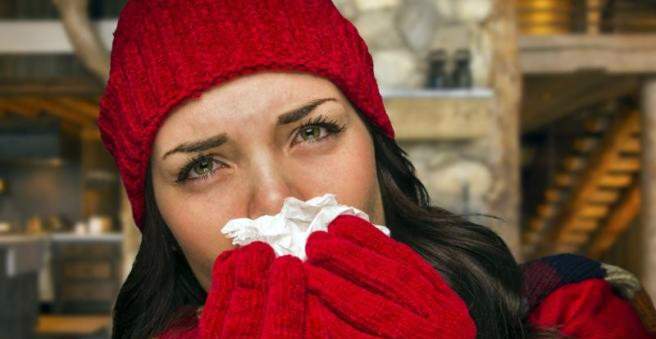Anxillary sinusitis (maxillary sinusitis) is an inflammation of the mucous membrane in one or both maxillary sinuses. These are the largest sinus cavities. They lie next to the nose and have the shape of an inverted pyramid. The sinusitis can be acute or chronic. In most cases, it is the result of a cold (viral infection). More rarely, for example, fungi, allergies or inflamed tooth roots are the cause of this form of sinusitis. Read more about the causes, symptoms and treatment of antritis.

Maxillary Sinusitis: Causes & Risk Factors
The sinusitis (maxillary sinusitis) may be like other forms of sinusitis due to Bacteria, fungi, viruses or allergies be caused. In most cases, it is preceded by a viral infection of the upper respiratory tract (especially cold). In addition, bacteria can spread on the infectious swollen mucosa. This eventually leads to antritis (or some other form of sinusitis).
An acute sinusitis can also occur at Injury of the maxillary sinus mucosa develop. This can happen, for example, in tooth extraction in the upper jaw or fractures in the area of the middle facial skull.
Less commonly, maxillary sinusitis originates from the tooth roots of the maxillary teeth (for example, in the case of tooth root inflammation). Doctors then speak of odontogenic (dentogenic) maxillary sinusitis (or maxillary sinus extension).
Risk factors of antritis
Various factors favor the occurrence of maxillary sinusitis. In children, for example, these are tonsils that are enlarged due to chronic inflammation (adenoid vegetation). Also, a chronic purulent cold, anatomical bottlenecks in the nose (such as curved nasal septum), cystic fibrosis and swimming pool visits can pave the way for an infection of the maxillary sinus.
Important risk factors in adults include, for example, a curvature of the nasal septum, nasal polyps, allergies, fungal infections, infections in the teeth, opportunistic infections (such as AIDS), intolerance to analgesics (analgesic tolerance) and diving.
Maxillary Sinusitis: Symptoms
A acute sinusitis is associated with dull to throbbing pain and a feeling of pressure in the area of the cheeks (maxillary sinuses). When bending over or hopping on one leg, the discomfort increases. In addition, with an antritis may cause toothache (in the upper jaw), headache, purulent nasal secretions, lower eyelid swelling, increased body temperature and overall fatigue.
A chronic maxillary sinusitis is associated with the formation of bad-smelling secretions in the nose and throat. In addition, there is often pain and pressure in the maxillary teeth of the affected maxillary sinus. However, the chronic antritis may also be painless. Other possible symptoms include headache, coughing (due to secretions draining into the throat), malodor and nasal obstruction. In children, chronic maxillary sinusitis also causes irritability, fatigue and swelling of the lymph nodes.
Maxillary Sinusitis: Diagnosis
First, the doctor asks about the complaints and possibly existing underlying diseases to the medical history to raise (anamnesis). Then one follows physical examination: In an antritis, the palpation of the cheeks causes pressure pain. Tapping the front molars (premolars) causes pain or intensifies existing pain. Even with the rapid bending over of the head pain occurs in the jaw area in an antritis.
As part of a ENT-medical examination The doctor will use an endoscope to examine the nose and throat. In maxillary sinusitis, pus is often found in the middle meatus or posterior pharyngeal wall.
Sometimes gets in during the investigation smear taken to determine the causative agent of inflammation and any resistance to drugs (antibiotics).
If necessary come to the clarification of an antritis also Imaging procedures for use. These include X-rays, ultrasound and computed tomography (CT).
Also one blood test (Differential blood picture, blood cell lowering rate, etc.) and a allergy test can be done. They can provide clues to the exact cause of the maxillary sinus infection.
Maxillary Sinusitis: Treatment
Antritis is primarily treated conservatively (non-surgically). An operation is rarely necessary.
Maxillary Sinusitis: Conservative Therapy
In acute maxillary sinusitis as well as acute episodes of chronic antritis may take several times a day decongestant nasal sprays be applied. In addition, the doctor may anti-inflammatory agent like diclofenac or ibuprofen. These agents can relieve pain at the same time. Eventually will also be herbal remedy (Myrtol or cineole) used.
In allergic maxillofacial inflammation of the doctor is a locally applicable cortisone (like fluticasone) prescribe. At one through the mushroom Aspergillus Inflammation helps Antifungals (Antifungal). If the cause of the sinusitis in the area of the teeth (such as tooth root inflammation), this must be rehabilitated by the dentist.
The Gift of antibiotics in an antritis is indicated only in certain cases. This applies, for example, to proven purulent inflammation with severe symptoms, imminent or actual complications, as well as limited immune defense (as in AIDS).
All conservative measures can provide relief for chronic antritis. However, the inflammation will come again and again, unless the cause or existing risk factors (such as anatomical bottlenecks) are eliminated. This may require surgery.
Maxillary Sinusitis: Operation
In certain cases of maxillary sinusitis, surgery is necessary. This applies, for example, if antritis with conservative measures can not get under control or has led to serious complications. Also in cases of maxillary sinus polyps as well as maxillary sinus (odontogenic) purulent sinusitis is operated on.
For example, the maxillary sinuses are punctured and rinsed with an aqueous antibiotic solution. Existing bottlenecks (polyps, crooked nasal septum etc.) can be surgically removed. This can stop the recurrence of cavernous inflammation.
Maxillary Sinusitis: Home Remedy & Alternative Medicine
Not only conventional medical measures help with sinusitis. Home remedies can also support the healing process. For example, inhalations (with thyme, chamomile, etc.) and heat packs are recommended.
Some patients also try it with homeopathy, Ayurveda and other methods of alternative / complementary medicine. The effectiveness of such methods is not scientifically proven. Nevertheless, many patients report a successful application Antritis and other forms of sinusitis.
Read more about the supportive treatment of sinusitis by inhalation, homeopathy & Co. in the article “sinusitis: home remedies”.